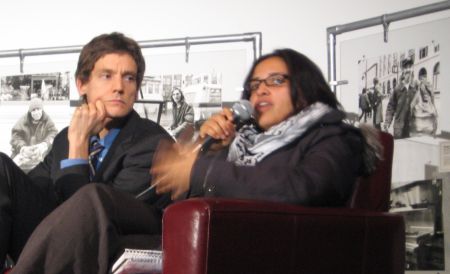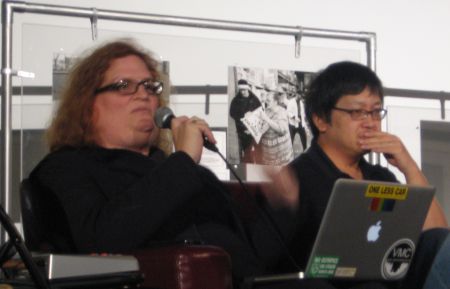STORY about Police/PrisonsMediaIdeas posted on December 19, 2010 by SandraCuffe
"Media is Just the Word for getting the Word Out"
David Eby, Henry Yu, Tami Starlight, and Harsha Walia Speak Out on Human Rights and Media
Also posted by SandraCuffe:
Also in Ideas:
Last week, on the eve of International Human Rights Day, the Chinese-Canadian National Council and W2 hosted a panel on human rights and the media in Vancouver.
British Columbia Civil Liberties Association director David Eby, professor and historian Henry Yu, member of both the Vancouver MediaCoop editorial collective and the Downtown Eastside Neighbourhood Council Tami Starlight, and migrant justice and community organizer Harsha Walia were the invited panelists. Georgia Straight editor Charlie Smith moderated the lively discussion on a broad range of topics related to human rights and media.
David Eby: RCMP Crackdowns on Critical Reporting about Policing in Northern BC
BC Civil Liberties Association (BCCLA) director David Eby shared his recent experiences in several communities in northern BC.
There is a "really interesting media revolution that's underway in these communities," said Eby.
According to the BCCLA director, most small towns in northern BC have a single weekly newspaper owned by a mainstream media corporation. 70% to 80% of the content comes from the police and the remainder is principally "feel good" community news, explained Eby.
In several communities, he continued, local news websites have sprung up, detracting from the advertising revenue and the readership of the mainstream print newspapers. Eby explained that some of these media sites have also been engaging in critical reporting about local policing issues, particularly the racist treatment of First Nations people by the RCMP.
"Most of the time in Canada, we don't actually put our journalists in jail," commented Eby.
He explained that repression is thus more difficult to see, because journalists are prevented from doing their jobs. In mainstream newsrooms, their stories may simply be killed by editors or owners. In northern BC, the sources on which journalists rely for information are being cut off.
The BCCLA director explained that following the Terrace Daily's critical reporting about local policing issues, the Daily has been subject to backlash from the local mayor, the business improvement associations, and the RCMP. In Williams Lake, also after critical reporting about the RCMP and racism, the RCMP stopped sending the media site any news releases at all, including the rural news updates concerning forest fires, road conditions, etc.
Henry Yu: Generational Interactions with Media and the Reaction to Maclean's "Too Asian" Story
UBC professor and historian Henry Yu shared his thoughts on how younger generations' interactions with media have radically transformed with the increasing use of the internet and online social media networks.
"The new media is transforming how students [...] are thinking about the world," said Yu, adding that "[they're] not reading newspapers anymore."
Yu explained that students are receiving news, but not via traditional print newspapers or television news programs. Students may not know what is hitting the headlines, Yu continued, but an extremely rapid "viral awareness" of an issue can spread like wildfire through social media networking sites like Facebook.
The example used by Yu to illustrate this generational difference was the reaction to a Maclean's article titled "Too Asian."
"Opening with an inflamatory, racist lede," explained Yu, the article questioned the increasing percentage of Asian students in Canadian universities, asking whether other Canadian students can compete against all of the honour roll Asian students with excellent study habits.
"Next thing you know, there's this huge reaction to this article," said Yu.
He explained that "nobody reads" Macleans anymore, or that at the very least, the Macleans audience generally consists of a much older generation of people of European descent, not Asian students. An exception to this audience is anyone in the waiting room at a doctor's office, he added, laughing.
The link to the online version of the "Too Asian" article was re-posted all over social media sites, and it quickly became the talk of the UBC campus. Yu read through approximately the first 1500 comments posted online in response to the article and said that some 90% to 95% of the comments were negative but reasonsed responses to the article.
It was "fascinating just how many saw right through the article," remarked Yu, adding that the sheer number of comments was exponentially higher than the response to any other Maclean's article.
"They're laughing because it worked. The sensationalist tactic worked," added Yu, describing how he sees the sensationalism so often found in journalism in the United States creeping more and more into Canadian journalism.
"Say something outrageous. See if it sticks. If it doesn't stick, say something else outrageous. That's sort of the approach south of the border," the history professor explained.
"There's always another Maclean's incident," added Yu.
Tami Starlight: Beyond the Content, Democratic Structures as Necessary for Democratic Media
The next panelist was Tami Starlight, an editorial collective member of the Vancouver Media Co-op (VMC), a board member of the Downtown Eastside Neighbourhood Council, and an anti-oppression activist.
"Tons of backroom deals are being cut right now," said Starlight, referring to the agreements between Vancouver City Councillors and land developpers.
Starlight explained that the deals over parcels of land in the Downtown Eastside have been taking place with no consultation and little to no media coverage. She highlighted both the Downtown Eastside Neighbourhood Council and the VMC as models for both media and community organizations.
"I believe that democratic spaces are [...] necessary, but difficult to maintain," said Starlight.
Participatory democracy and anti-oppression cannot only be addressed in the content of media coverage or in the issues on which an organization works; they must also be the foundation of the organization's structure and decision-making process, she explained.
"Basically, the old guard of our media, I believe, should be a thing of the past," remarked Starlight, in response to a question posed by Henry Yu about how the next generation of journalists will replace the old.
Harsha Walia: Unraveling the Myths of Objectivity and "Special Interests"
"My hope is that the whole old system kind of evaporates," said migrant justice, No One is Illegal, and community organizer Harsha Walia.
"I think there's actually an increasing diversity in media," she added.
Walia proceeded to explain why the stereotypical definitions of "mainstream" and "alternative" media need to be deconstructed.
"What is mainstream?" she asked.
The Aboriginal People's Television Network (APTN) and many South Asian community radio stations could compete with many media outlets in terms of the numbers of viewers and listeners, as well as the general editorial position, asserted Walia. However, because their audiences are principally racialized communities, these media are "ghettoized" and not seen as mainstream, she added.
Walia also pointed out that some progressive media with a progressive political editorial line could also complete in terms of numbers of listeners, viewers, and readers. Al Jazeera English and Democracy Now are two examples highlighted by Walia, who pointed out that their content is diverse and they are both also very invested in investigative journalism.
Another common perception about racialized community media and journalists is the perception of bias, she explained.
"We're sold this idea that media is objective," said Walia.
On the one hand, media is increasingly saturated with conservative commentators, right-wing think tanks, and journalists embedded with military forces. These elements are presented and often accepted as objective, said Walia.
On the other hand, people of colour, women, migrant community members, and other marginalized voices are often automatically assumed to be biased when reporting on anything related to race, gender, immigration, or discrimination, explained Walia. These voices are seen as not objective more often than not, added Walia.
"Your social location is perceived as bias," said the community organizer, who has also written for both mainstream and alternative media.
Envisioning the Future of Our Media
Panelists David Eby, Henry Yu, Tami Starlight, and Harsha Walia did respond to a question from the audience about the murders of journalists around the world, but the discussion about human rights and the media was leaps and bounds beyond the usual facts and denunciations about journalists who have been murdered, jailed, threatened, and harassed in the line of work. Georgia Straight editor Charlie Smith kept the conversation rolling about a diverse range of topics, from police repression in northern BC to perceptions and responses to racism in the media.
From mainstream journalists to the vibrant migrant community media in languages other than English, to local media co-operatives and collectives, the panelists' interventions returned again and again to the idea of looking forward to envision how democracy, participation, and anti-oppression can be a central part of all kinds of media in the future.
"We all have stories to tell," said Harsha Walia.
"Media is just the word for getting the word out," added Henry Yu.
The site for the Vancouver local of The Media Co-op has been archived and will no longer be updated. Please visit the main Media Co-op website to learn more about the organization.


Comments
You're awesome, Sandra!!
Thanks for coverng this: I wish I could be a bit more useful like you.
Thanks!
Ha ha, but your convocation action counts for at least 20 of my articles, if you really want to compare utility...
Utility is for clowns!
What matters is content and taking off a robe has no content, whereas raising awareness about issues does, so good for you for having more funk than flash than clowns like me.
funk
i'd love to keep it up just for the sake of arguing that you are funkier, but i've never been described as having funk & quite like it, especially for the multiple definitions of the word. 2 work pretty well. thanks! ;)
oops
accidentally double clicked & can't figure out how to delete the second repeated comment. so...
no i'm not! you're funkier!